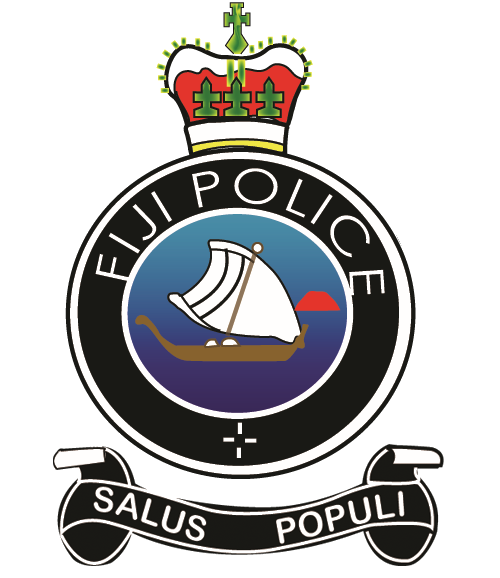About Us
The Beginning: The Armed Native Constabulary
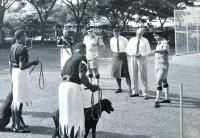
The Fiji Police Force as it exists today was created by the new Colonial Administration when the first officers were appointed by notice in the Royal Gazette dated 10th October 1874, and the ADC to the Governor was appointed Superintendent of police. He was Lieutenant Henry Olive of the Royal Marine Light Infantry and although he had no previous experience of policies duties he was ideally suited to the job of training the men who were destined to become the Armed Native Constabulary (ANC).
The Gazette issue made several appointments but none was to affect the police more than that of Henry Olive. After the ceremonial signing of the Deed of Cession the flag of the Cakobau Government was; lowered and the raising of the Union flag signified the entry of Fiji into the British Empire.
Lieutenant Olive had spent much time with the ANC (Armed Native Constabulary, the new name of the Royal Army) until 1906, when it was abolished; it would be described as a military, and not a Police Force, but was always commanded by a police officer.
Four Different Classes of Police
There were in fact different classes of police
- The ANC, known to Fijian as Sotia
- The Regular Police in Levuka and Suva
- The rural police reporting to District Commissioners and
- The village police responsible to the turaganikoro (village headman)
Uniforms were similarfor lower ranks, while isulu Tavatava worn with a blue collarless tunic, patterned after the original Chinese blouse uniform worn by the first recruits. Only the buttons were different. Those of the sotia were brass while the ovisa, as all other police were called, wore silver buttons.
Relocation period
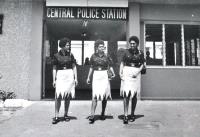
The capital officially relocated when the Governor and his staff left Levuka at midnight on 30th October, 1882 and transferred by ship to Suva. The Police Force had maintained a station in Suva and it was the first government Department to move, setting up headquarters at the present site of the Suva Police Station now called Central Police Station. The area became known as Totogo, after the name of the site of the original Police Station in Levuka.
The ANC set up camp at Nasova, which was also named after their camp in Levuka. With space to grow, Suva soon began to provide extra challenges to the Fiji Police, with law enforcement problems.
First Batch of Women Police Officers

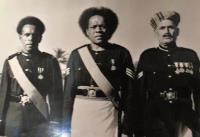
At the start of the year 1970, many countries were considering the role of women in the uniformed services. This departure from tradition was due to many considerations including the part played by women in World War II, and the increasing strength world wide of the feminist movement.
The idea of recruiting policewomen in Fiji was mooted as early as the 1960s, when the Colonial Government was urged to recognize the status of women by the YWCA and the Methodist Church. Women were playing an increasingly important role in community affairs. The Colonial government, under pressure but not having studied the problem thoroughly, agreed in December 1968 to a pilot scheme whereby women could be recruited into the Special Constabulary. At this stage the government had not clearly defined the part women would pay in the organization, if and when they should be fully integrated in the Fiji Police.
The eight women who formed the Special Constabulary (Women) in 1968 were:
- Susana Touwa
- Merewalesi Mataika
- Kelera Tokalau
- Menani Vukivuki
- Adi Litia Vuniwaqa
- Nellie Peters
- Kesaia Masivivi
- Annabella Peters
These Special Constable continued to serve in that capacity until mid 1970, when the Government bowed to pressure and decided to admit women as an integral part of the Police Force, Six of the Special Constable were selected with seven others to form the first batch of thirteen women recruits to undertake the course.
Change of Name
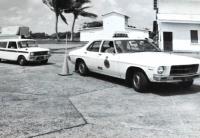
It was finally decided that he date of Independence would be the 10th October 1970, which would be the 96th anniversary of Fiji Cession. It had been popularly supposed that the date would be on the hundredth anniversary I 1984. For the Police it would mean a change of name to the Royal Fiji Police Force and a similar honour was conferred on the Fiji Military Forces. All the matters concerning the Fiji Police were directed to the Minister for Home Affairs.
Another Change of Name
On the 5th October 1987, Fiji was declaring a Republic, the Governor General resign and the following day the Fiji dollar was devalued. On the 15th, the Governor General agreed to become the first President of the Republic. In Vancouver the Heads of Commonwealth Governments met and declared that the Commonwealth membership of Fiji ended when the country became republic. The immediate effect on the Police Force was that the title Royal was removed from its name.
Training
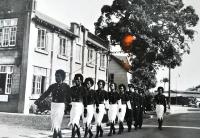
On 15th June 1967 the new Commissioner RTM. Henry arrived in the colony and assumed command. The new Commissioner came from Sarawak having served twenty years in the Colonial Police mostly in Malaya.
He brought a fresh concept of Police duties to Fiji, where previous Commissioner’s had come from the Middle East, Africa and South America. Fresh from wealthy Sarawak, he had trouble adjusting to the shortage of funds in Fiji. An early example of this was when a new building was completed at Nasova which combined classrooms for a school, now the Police Academy, and a gymnasium. When the latter was completed it was just an empty building, no estimate for equipment having been included in the budget. It was a year before the requirements for fittings were included in estimates and approved by the Legislative Council, so the building could be used for the purpose for which it was designed.
Under the heading Recruitment and Training the report for 1967 recorded for the first time a pleasing increase in academic achievements of Police recruits. In addition to Recruit course, Leadership courses for promising constables were held. It was a measure of the regard in which the Fiji Force was held by other island territories that they sent several candidates for police training during 1960s. This included both officers and men and they came from the Gilbert Islands (now Kiribati), the New Hebrides (now Vanuatu), the Solomons and Tonga. In addition to normal police duties, fingerprinting was taught and personnel from the New Hebrides also attended anti burglary course.
- 1906 – Police Depot
- 1973 – Police Training College
- 1989 – Fiji Police Academy (Old curricular still in use)
- 1997 – Fiji Police Academy (Competency Based Training introduced by Aust Aid but old structure still in use)
- 2003 – Introduction of the new structure, 1 Commandant, 3 Deputy Commandant
- 2006 – Introduction of the Blueprint
